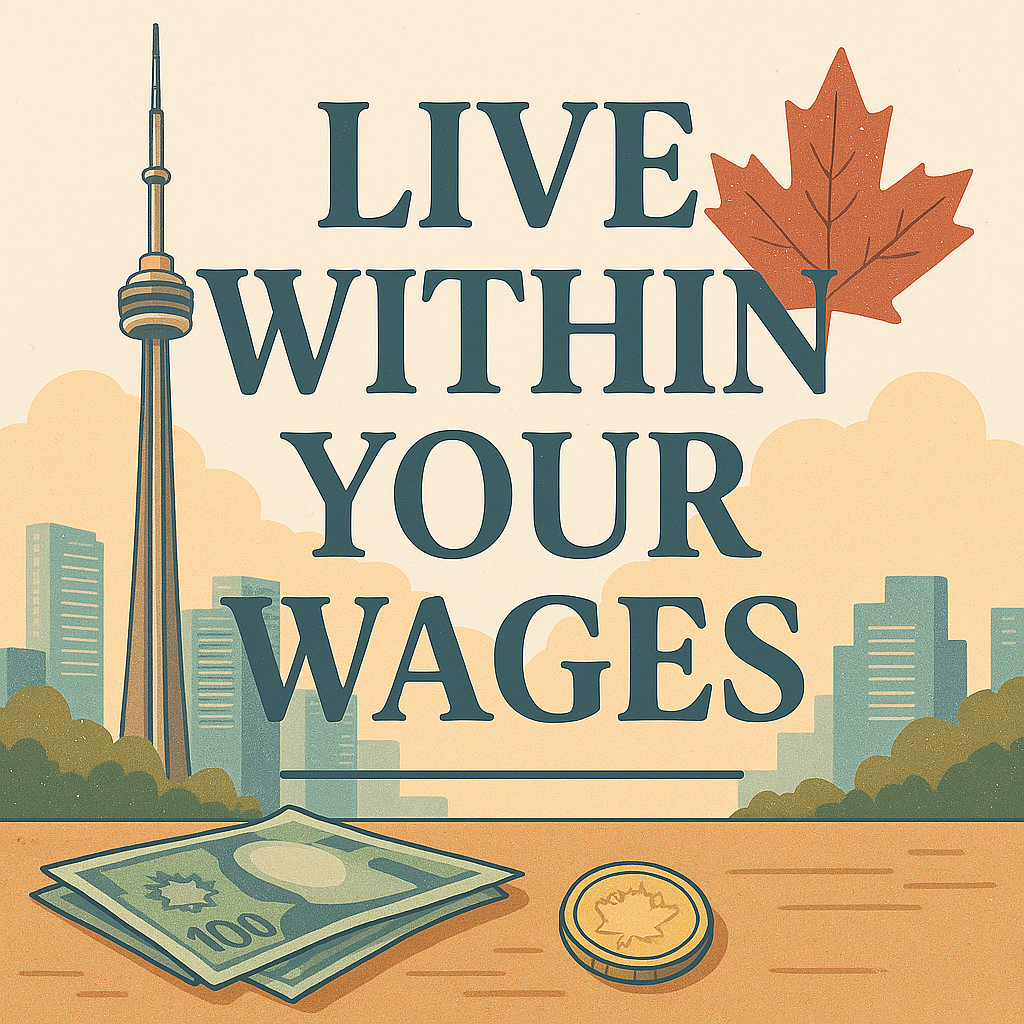
For decades, personal finance experts have preached the mantra: “Live within your means.” But for many Canadians, that phrase feels vague, outdated, and even dismissive. What does “means” mean anyway? Credit limits? Future raises? Family support? Far too many include their credit limit when they think of their means.
It’s time to shift the conversation to something more grounded and actionable: living within your means, or in other words, living within your wages. This is the best way to plan and budget; otherwise, you could be headed for a financial downfall.
This mindset is especially vital in 2025, as inflation, housing costs, and stagnant wages continue to challenge Canadians. Living within your wages isn’t about deprivation; it’s about clarity, control, and building a financial life that reflects your reality. I know the last time I received a wage increase was 2 years ago when I switched jobs. It is time to do better with what we have.
What Does “Living Within Your Wages” Really Mean?
Living within your wages means building a lifestyle based on your actual take-home pay, not your credit card limit, not your projected bonus, and not what influencers say you should be spending. It’s about making intentional choices that align with your current income and financial goals. It’s finding a way to become content with what you have.
This approach helps you:
- Avoid debt traps and payday loans
- Build financial resilience
- Reduce stress and shame around money
- Create space for savings and future growth
Why “Means” Can Be Misleading
The term “means” is often interpreted loosely. It can include access to credit, family support, or even assumptions about future income. But these are unreliable foundations for financial planning. Always plan with what is reliably coming in the door.
By contrast, wages are concrete. They’re what you earn today. And when you build your budget around them, you’re working with facts, not wishful thinking.
How to Start Living Within Your Wages
Here’s a step-by-step guide to help you embrace this mindset and build financial stability:
1. Know Your Net Income
Start with your after-tax income that lands in your bank account. Use pay stubs or CRA MyAccount to get accurate monthly figures. If your income fluctuates, use a conservative average. Look at what you have brought in in the last 6 months and divide by 6 and take off 10% to be conservative.
2. Build a Wage-Based Budget
Create a budget that reflects your real income. Prioritize essentials like housing, food, transportation, and savings. Use free Canadian tools like KOHO or YNAB or a Google Spreadsheet to track spending
3. Avoid Lifestyle Inflation
When your income increases, resist the urge to upgrade everything. Instead, use raises to pay down debt, build savings, or invest. Living within your wages means staying grounded even when you earn more.
4. Use Cash or Debit
Avoid relying on credit cards for everyday expenses. Paying with cash or debit keeps spending tied to your actual income and helps you avoid interest charges.
5. Set Spending Limits Based on Wages
Instead of asking “Can I afford this?” ask “Does this fit into my wage-based budget?” This shift helps you avoid impulse purchases and debt traps.
6. Build a Buffer
Even on a modest income, aim to save a small emergency fund. Start with $500–$1,000 to cover unexpected expenses without relying on credit. Want suggestions on building your emergency fund? Check out this post.
7. Track Every Dollar
Use a simple spreadsheet or app to track income and expenses. Seeing where your money goes helps you stay accountable to your wages.
Real-Life Examples of Wage-Based Living
Let’s say you earn $3,000/month after taxes. Here’s how a wage-based budget might look:
| Category | Monthly Allocation |
|---|---|
| Rent | $1,200 |
| Groceries | $400 |
| Transportation | $200 |
| Cell/Internet | $150 |
| Streaming/Entertainment | $75 |
| Savings | $200 |
| Miscellaneous | $175 |
| Total | $2,400 |
This leaves $600 for seasonal expenses, debt payments, or extra savings. The key is that every dollar is accounted for—and tied to your actual income.
Why This Matters for Canadians
Living within your wages is about financial dignity. It’s not about deprivation, it’s about clarity, control, and confidence. When you build a life based on what you earn, you reduce stress, avoid debt, and create space for real financial growth.
This approach also helps you:
- Avoid payday loans and high-interest debt
- Make informed decisions about housing, transportation, and lifestyle
- Feel empowered instead of ashamed about your financial reality
Final Thoughts
Living within your wages is a radical act of self-respect in a world that constantly pushes you to spend more. It’s not flashy, but it’s powerful. And for Canadians who earn less, it’s the foundation for financial freedom.
Let me know, do you live by your actual income?


Leave a Reply